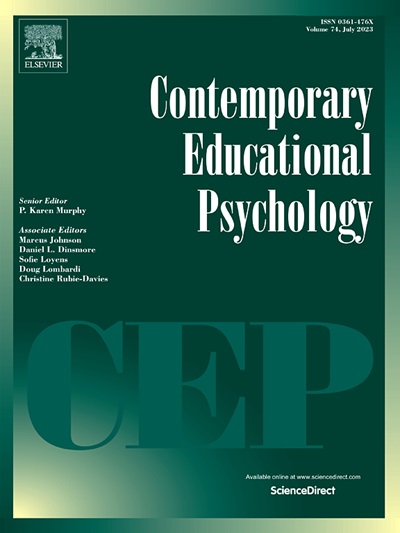When will they know what they don’t know? Political knowledge and the infamous “Unskilled and Unaware” effect
IF 3.8
1区 心理学
Q1 PSYCHOLOGY, EDUCATIONAL
引用次数: 0
Abstract
The unskilled and unaware effect, also known as the Dunning-Kruger effect, describes that low performers tend to overestimate and high performers tend to underestimate their ability and that on average low performers provide less accurate estimates of their ability than high performers. Based on data from N = 1047 students in Grade 7 (n = 613) and Grade 10 (n = 434), we examined whether the unskilled and unaware effect exists with regard to high school students’ political knowledge, whether the effect is different in Grade 7 and Grade 10, and how teachers’ behavior (i.e., cognitively activating and motivating teaching) affects students’ judgement accuracy and judgement direction. The results show that the unskilled and unaware effect exists in both grade levels. Furthermore, visual and statistical examination of the data suggest that the pattern of data is very similar in both grade levels. Finally, we further find that perceived motivational quality is associated with judgement accuracy, but also with overconfidence. Perceived cognitive activation is negatively associated with judgement accuracy. Through the usage of two-cohort data, this study applies a novel approach and bears important implications for research on the unskilled and unaware effect. Furthermore, the results regarding the teachers’ behavior provide important insights for educational practice in civic education.
他们什么时候才能知道他们所不知道的?政治知识和臭名昭著的“不熟练和不知情”效应
不熟练和无意识效应,也被称为邓宁-克鲁格效应,描述的是低绩效者倾向于高估自己的能力,而高绩效者倾向于低估自己的能力,平均而言,低绩效者对自己能力的估计不如高绩效者准确。本文以7年级(613名)和10年级(434名)的1047名学生为研究对象,考察了高中生政治知识是否存在不熟练和不知情的效应,以及7年级和10年级的影响是否不同,以及教师的行为(即认知激活和激励教学)如何影响学生的判断准确性和判断方向。结果表明,两年级均存在不熟练效应和不意识效应。此外,对数据的视觉和统计检查表明,两个年级的数据模式非常相似。最后,我们进一步发现,感知动机质量与判断准确性有关,但也与过度自信有关。感知认知激活与判断准确性呈负相关。通过双队列数据的使用,本研究采用了一种新颖的方法,对研究非熟练和不知情效应具有重要意义。此外,关于教师行为的研究结果为公民教育的教育实践提供了重要的见解。
本文章由计算机程序翻译,如有差异,请以英文原文为准。
求助全文
约1分钟内获得全文
求助全文
来源期刊

Contemporary Educational Psychology
PSYCHOLOGY, EDUCATIONAL-
CiteScore
16.50
自引率
3.90%
发文量
74
期刊介绍:
Contemporary Educational Psychology is a scholarly journal that publishes empirical research from various parts of the world. The research aims to substantially advance, extend, or re-envision the ongoing discourse in educational psychology research and practice. To be considered for publication, manuscripts must be well-grounded in a comprehensive theoretical and empirical framework. This framework should raise critical and timely questions that educational psychology currently faces. Additionally, the questions asked should be closely related to the chosen methodological approach, and the authors should provide actionable implications for education research and practice. The journal seeks to publish manuscripts that offer cutting-edge theoretical and methodological perspectives on critical and timely education questions.
The journal is abstracted and indexed in various databases, including Contents Pages in Education, Australian Educational Index, Current Contents, EBSCOhost, Education Index, ERA, PsycINFO, Sociology of Education Abstracts, PubMed/Medline, BIOSIS Previews, and others.
 求助内容:
求助内容: 应助结果提醒方式:
应助结果提醒方式:


